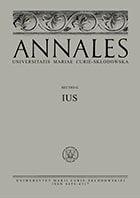Zalety i wady Afrykańskiej Karty Praw i Dobrobytu Dziecka
Advantages and Disadvantages of the African Charter on the Rights and Welfare of the Child
Author(s): Anna DąbrowskaSubject(s): International Law, Human Rights and Humanitarian Law, International relations/trade, Family and social welfare
Published by: Wydawnictwo Naukowe Uniwersytetu Marii Curie-Sklodowskiej
Keywords: African Charter on the Rights and Welfare of the Child; ACRWC; declaration; convention; children’s rights;
Summary/Abstract: Africa is the only region in which a multilateral international agreement has been created to protect children’s rights – the African Charter on the Rights and Welfare of the Child (ACRWC). Its objective is to provide an African framework for protection and promotion of children’s rights in Africa. The treaty has not emerged out of a legal vacuum. It has been preceded by a number of international documents of universal and regional nature, namely, declarations and conventions regarding children’s rights. Interpreting the successive provisions of ACRWC, a catalogue of children’s rights closely related to the regional culture, its strengths and weaknesses can be identified. The Charter’s advantages certainly include matching of the treaty to realities of the African continent and a comprehensive approach to protection of children’s rights covering all their categories. Absence of definitions for terms contained in its particular provisions is a drawback.
Journal: Annales Universitatis Mariae Curie-Skłodowska, sectio G – Ius
- Issue Year: 67/2020
- Issue No: 2
- Page Range: 89-109
- Page Count: 21
- Language: Polish

